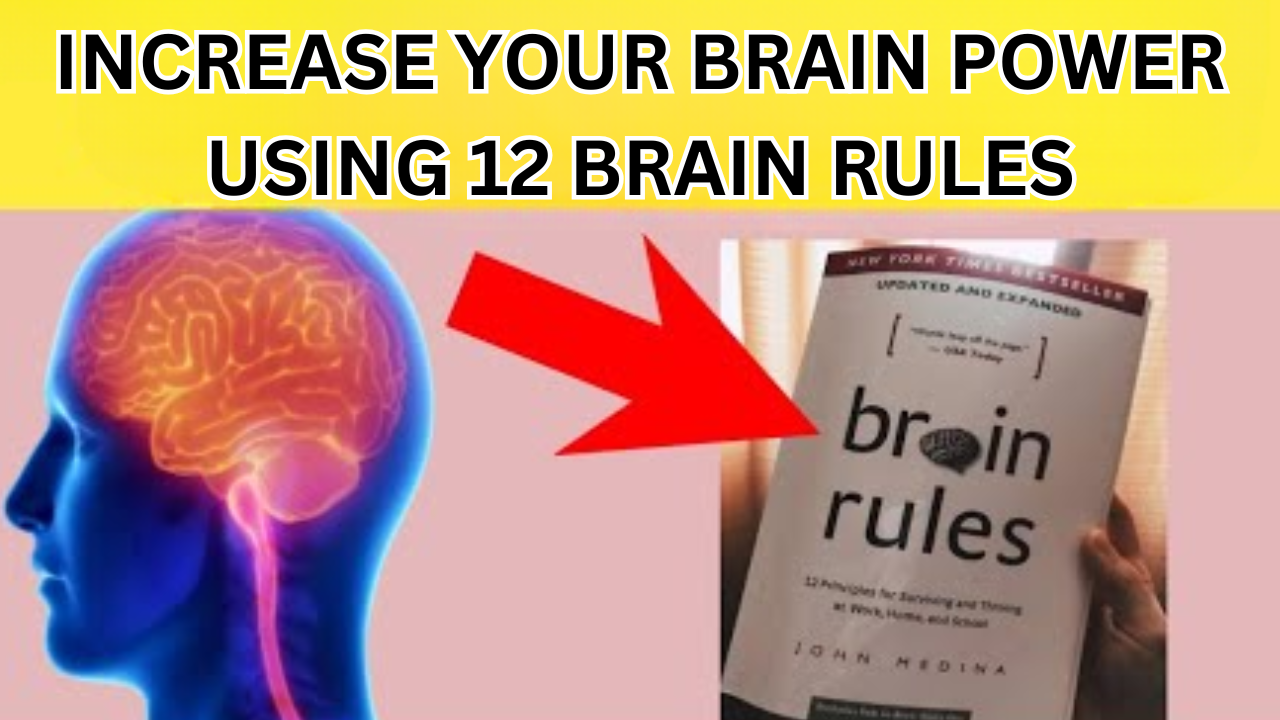Have you ever wondered why some days your mind works at a great speed and sometimes it seems that it is moving in slow motion, that is, your mind is not completely in your control, that is why today we will talk about molecular biologist John Marina’s book Brain Rules, which reveals such 12 powerful brain rules that can transform your thinking, learning and overall life. From better memory to improving focus, this book tells the way to unlock the hidden potential of your brain so that you can take your brain to the next level. So let’s start.
Rule no 1 The Human Brain Evolved:
Let’s simplify science and start from the first rule, rule number one The Human Brain Evolved According to Darwin’s Theory of Evolution, we have evolved from monkeys to humans, which took billions of years, but these changes were not just physical, our brain has also evolved with time, that is, it has developed. Our brain has been created for survival to solve these problems and Designed to survive in unpredictable environments First we had the lizard brain which controlled basic functions like breathing Then came the cat brain which controlled the brain
which handles our emotions and fear Whenever there is danger, the brain reacts Then we developed the cortex which is a powerful part of the human brain It helps us understand complexities Because of this evolution we humans have become experts in problem-solving Understanding the thoughts of others Working in groups We were able to dominate our unconnected world.
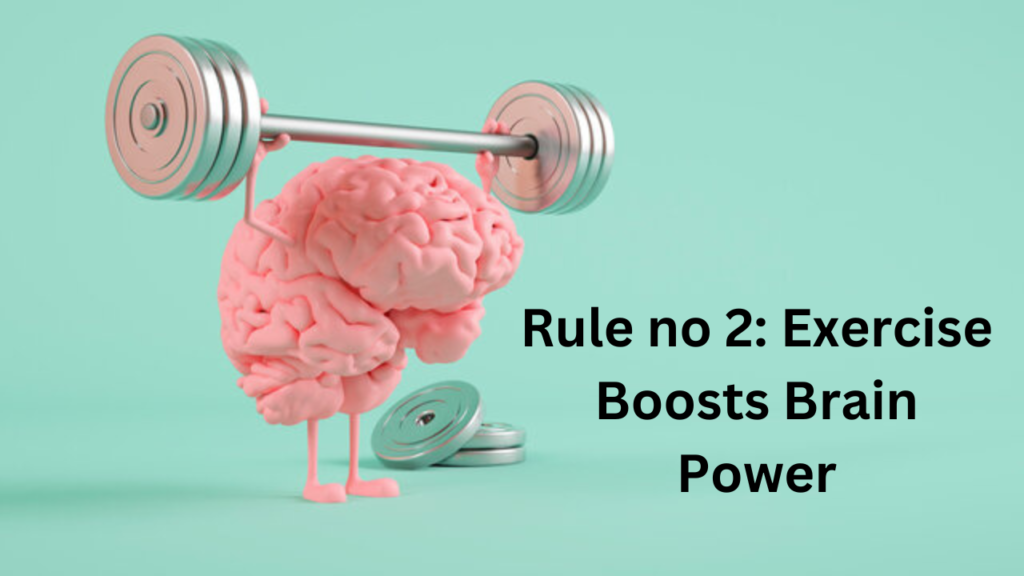
Rule no 2: Exercise Boosts Brain Power:
Rule number two Exercise boosts brain power Movement is our brain’s best friend During evolution our ancestors used to move all day They used to roam around hunting and this movement kept their brain sharp Today
Our sedentary lifestyle does not give the human brain the movement it needs When we exercise our brain gets glucose and oxygen which keeps the neurons alive and creates new ones Builds brain cells Harvard psychiatrist John Ratey says exercise works like Miracle Grow for your neurons. Miracle Grow is a plant fertilizer that helps plants grow and become healthy. In the same way, exercise works like a fertilizer for the neurons in your brain. When you exercise, your brain releases a chemical called brain-derived neurotrophic factor that helps neurons grow and repair.
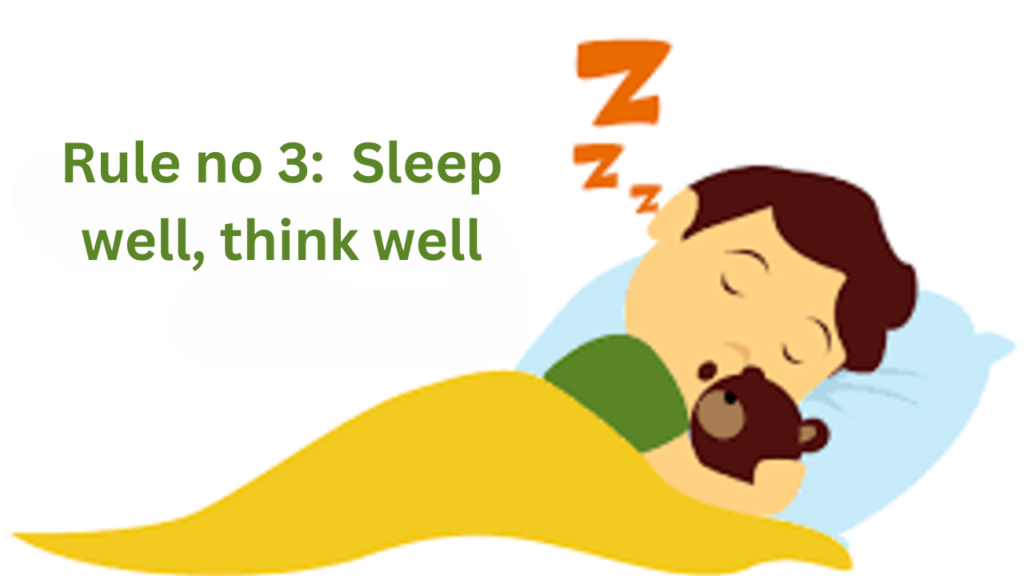
Rule no 3: Sleep well, think well:
Rule number three: Sleep well, think well. Sleep is king. When we sleep, our brain processes the day’s information, sorts it out and turns it into memorable memories. Without sleep, your brain slows down. Your decision-making ability and memory both weaken. A Harvard study shows that if you are sleep-deprived, your reaction time and cognitive ability decrease by up to 40 percent, and proper
sleep improves your creative problem-solving skills and learning. There is a lot of improvement. DJ Peter Tripp from New York hosted a marathon radio show without sleeping for 200 hours. The result was that he started having seizures. His brain started showing wrong images and scenarios. His mental state deteriorated so much that it became difficult for him to differentiate between reality and imagination. Therefore, proper sleep not only makes you fresh and alert but also recharges your brain and maintains its functioning.
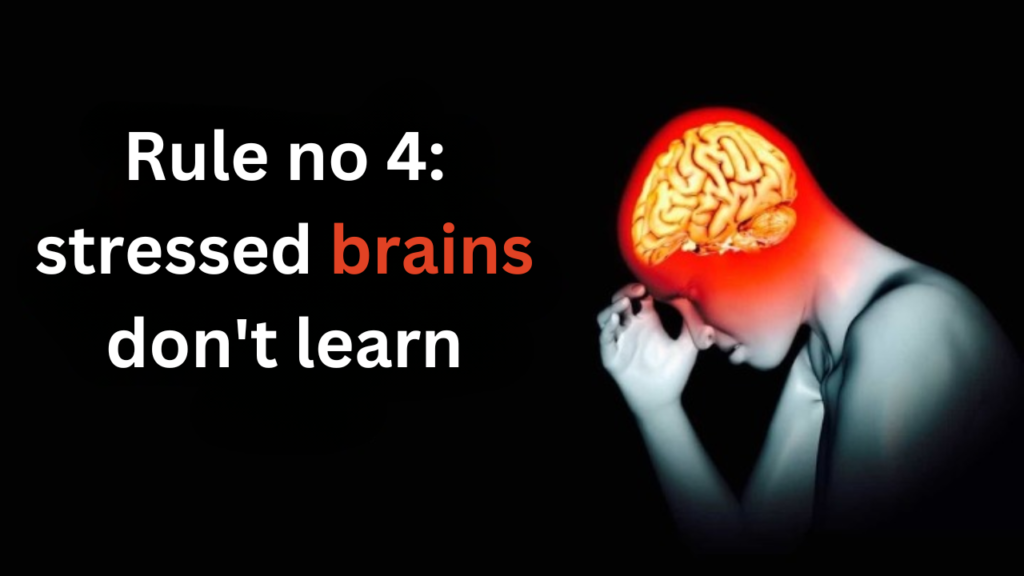
Rule no 4: stressed brains don’t learn:
In the same way, when we are stressed, our body goes into fight or flight mode, and chronic stress damages important areas of our brain. Research says that chronic stress shrinks the hippocampus, which directly affects your memory and learning abilities. This damage can be long-term. Therefore, it is very important to manage stress. This study shows that during stress, the neurons of our brain do not fire properly, which affects problem-solving and creativity. In a famous experiment, a German
Shepherd was given electric shocks but even when he had the option to run away, he did not react because the stress had damaged his brain so much that he froze. This is the impact of stress on our brain. That is why stress management techniques like mindfulness and exercise are very important.
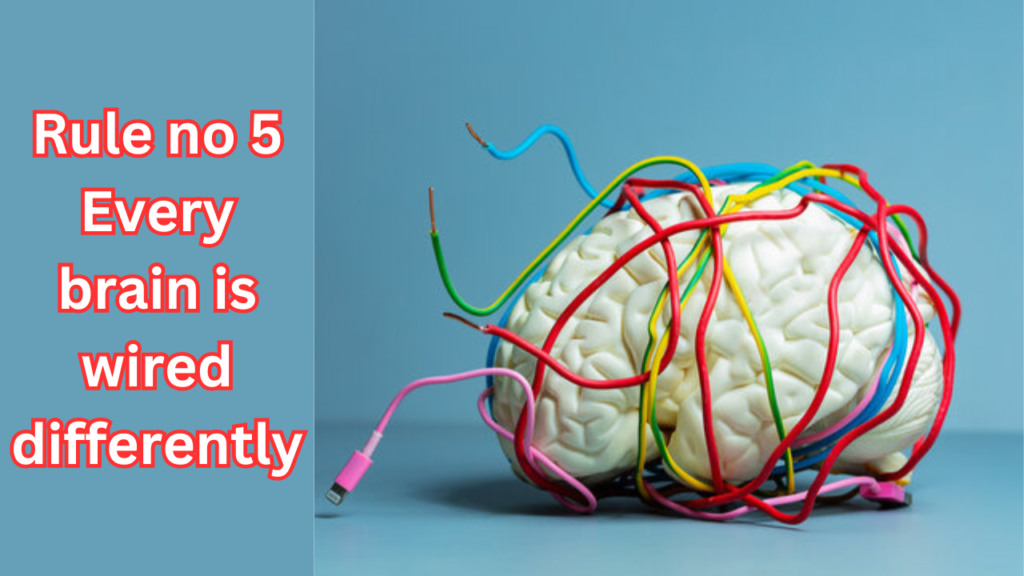
Rule no 5: Every brain is wired differently:
Rule number five: Every brain is wired differently. Every person’s brain is unique. We all think differently, learn differently and all this happens because of our brain wiring. The way you process information is
You evolve through your personal experience and learning. Neuroscientists have proven that when we learn new experiences and skills, our neurons make new connections. This process is called brain plasticity, which helps you to continuously evolve and adapt. That is why every person’s learning ability is different. Let’s take the example of Michael Jordan. He was the biggest champion of basketball, but when he tried to make a career in baseball, he could not succeed because his brain was wired for basketball but not for baseball. Every person’s talent and learning capacity depends on his brain wiring.
Rule no 6: We don’t pay attention to boring things:
Rule number six: We don’t pay attention to boring things. Our brain pays attention only to those things which are either interesting or emotional. Paying attention to boring things is a struggle for the brain because our attention span is limited. In today’s time where there are so many distractions, our brain Focuses only when something is emotionally engaging or exciting. Research shows that our attention span is around 10 minutes. If after that you do not find anything interesting or engaging, then your brain starts losing attention. To activate the reward system of the brain, some exciting or emotional inputs are necessary. If you are sitting in a class or meeting and you find something boring, then after 10 minutes you automatically zone out. Many times we forcefully pressure ourselves to do such tasks which are boring for us and then we keep failing in them again and again. To avoid this, make those tasks engaging by doing anything so that you can remain fully focused.
Rule no 7: repeat to remember:
When If you want to remember something new, just reading or listening to it once is not enough. You have to repeat that information again and again so that your brain can store it in long-term memory. Studies show that when you repeat something in spaced intervals, your memory improves. Your brain needs continuous exposure so that the neurons can make strong connections. Do these spaced repetitions. You have to memorize a topic for the exam. If you study it for just one day, you will remember it in the short term but you will forget it in the long term. But if you revise that topic a little bit every two to three days, then the brain will store it in long-term memory.
Rule no 8: Stimulating the more senses:
Rule Number 8 Stimulating the more senses it uses, the better it processes the information. When you experience the same thing through multiple senses like seeing, hearing, or touching, then your brain stores that information better. The more senses you develop, the stronger your memory will be. In a study, people were asked to memorize a list. When they were just asked to read it, when they were shown the same information with visuals and they got a chance to interact with it, their recall was much better. That is why we remember the stories of movies and TV shows better because we watch, listen, and experience them. If you are just reading something, then only a limited part of the brain is active, but when you watch or listen to that thing, more areas of your brain become active, which makes learning and memory more effective. And if we talk about the most powerful sense, then it is vision.
Rule no 9: Vision tames all other senses:
Rule number nine. Vision tames all other senses. Our brain spends 50% of its energy in visual processing only. When we see something, the brain converts that visual into a story which gets stored strongly in the memory. Vision is called the super sense because visual learning is the most powerful way to remember information. In an experiment, people were told a speech but without visuals, they quickly lost interest. When visuals were added, people understood the information more effectively and also remembered it. This proves that our brain gives priority to visuals and that is why images or videos are more important in our mind.
Rule no 10: Study or Listen to Boost Cognition:
Henry was a 92-year-old dementia patient who was completely unresponsive for years. He had lost his memory and personality and the doctors also considered the chances of his recovery to be very low. But when his favorite music was played to him, a change was seen. He suddenly started singing, started remembering his old memories, and started remembering his old memories. Music has started showing its effect on actions as well The effect of music is not limited to just emotions It also boosts the cognitive functions of the brain Studies have proved that music improves memory, attention, and learning skills Music has a direct connection with multiple regions of our brain which activates memory and focus and enhances overall cognitive performance Research says that specific types of music like classical music synchronize the firing rate of neurons which improves problem-solving and concentration Music therapy is also helpful for those who have memory related issues like dementia.
Rule no 11: Male and female brains are different:
Rule number 11 Male and female brains are different for all of us. We know that the way of thinking of men and women is different, but this is not only due to upbringing or culture, science says that the structure and functioning of their brains is also different. That is why the way of processing stress, emotions, and memory is different for both males and females. Research shows that during stress, the right amygdala of men is activated, which helps them to understand logically, while the left amygdala of women is activated, which helps them to remember emotional details. That is why in stressful situations, the reaction of men and women is different.

Rule no 12: We are powerful and natural explorers:
Rule number 12 we are powerful and natural explorers we have all been curious since childhood. Touching, seeing, and understanding everything is an instinct of our brain. When we explore new experiences, our brain makes new neural connections, which make us smarter and more adaptable. This is very important for our growth and learning. Research says that the hippocampus of the brain the campus that controls learning and memory grows only when we seek out new experiences. This ability helps us to adapt to every new situation.
Neuroscience proves that our brain is always wired to learn and explore something new. Think of a small child. Even when the parents forbid it, the child still explores things because his brain naturally wants to learn.
Conclusion:
The document highlights 12 brain rules from molecular biologist John Medina’s book Brain Rules, aimed at enhancing mental performance. These rules emphasize the importance of evolution, exercise, sleep, stress management, individualized learning approaches, repetition, sensory engagement, vision prioritization, music, gender differences, and exploration. Together, these principles provide a practical guide for improving memory, cognition, and adaptability while promoting overall brain health.
FAQs
1. How does exercise impact brain power?
Exercise boosts brain function by increasing the flow of glucose and oxygen, which nourishes neurons and promotes the growth of new brain cells. It acts like “fertilizer” for the brain, enhancing learning and memory.
2. Why is sleep essential for cognitive performance?
Sleep allows the brain to process daily information, convert it into long-term memories, and recharge. Sleep deprivation impairs memory, decision-making, and problem-solving abilities, reducing reaction time and creativity.
3. How does stress affect learning?
Chronic stress damages the hippocampus, a critical area for memory and learning. It reduces neuron activity, stifling creativity and problem-solving. Stress management techniques are essential to mitigate these effects.
4. Why are visuals more effective for memory?
The brain dedicates 50% of its resources to visual processing, making vision the most dominant sense. Visual learning is impactful as it creates strong, memorable connections compared to text or speech alone.
5. Are male and female brains different?
Yes, male and female brains differ in structure and response to stress. For instance, men process stress logically through the right amygdala, while women focus on emotional details via the left amygdala, leading to varied reactions.
